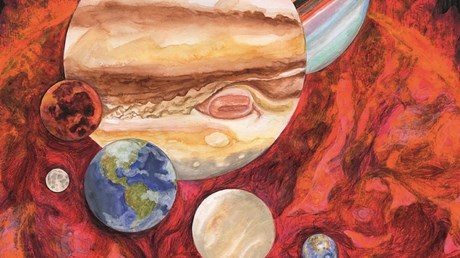The singer-songwriter’s latest collaboration sets a distinctly biblical course through the Created Order.

Theologians often look to artists for inspiration—and, so long as the artist and the inspiration are right, this relationship can greatly benefit Christian thinking. Karl Barth’s emphasis on sin, for instance, would make his work morose if not for his constant rejoinder of God’s delight in creatures and our utter joy in the face of grace—an insight he gained from his love of listening to Mozart.
What artist might theologians in the 21st century look to for encouragement? Perhaps one of the best is the musician Sufjan Stevens, whose instrumentation draws from folk, electronica, and classical, and whose lyrics involve a deep explication of Greek myth, personal existence, local geography and history, and Christian theology.
Of all the themes Stevens has emphasized, the most current muse is Creation. He recently offered some of his thoughts on the orders of Earth and life around us in an interview for NPR; more significantly, though, his recently released Planetarium—a collaborative album with Nico Muhly, Bryce Dessner, and James McAlister—presents an electronic symphony dedicated to the solar system.
Those familiar with Stevens’s earliest work know that Creation has been one of his concerns since the beginning. Throughout his music, Stevens does not merely consider the beauty of nature and then mix it with a few scriptural references, nor does he sing a contemporary environmentalism sprinkled with Christian blessing. Instead, he has something deeper—and more evangelical—in mind.
When tackling the topic of Creation, Christian theologians and political thinkers often err in two ways: They either muse on the natural orders of the world or advocate a worldly politics, only adding …
Source: Christianity Today Most Read